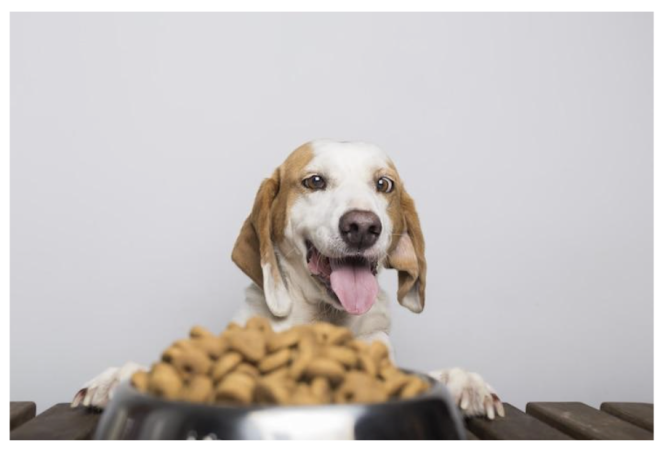- Change theme
Is Grain-Free Dog Food Better? Everything You Need to Know

If you’ve ever browsed the pet food aisle or scrolled through online forums, you’ve likely come across the growing popularity of grain-free dog food.
04:18 10 July 2025
If you’ve ever browsed the pet food aisle or scrolled through online forums, you’ve likely come across the growing popularity of grain-free dog food. Marketed as a healthier, more natural option, it has attracted pet owners looking to improve their dog’s diet. But is grain-free dog food truly better, or just another trend riding the wave of human diet fads?
Let's cut through the noise and explore what grain-free really means for your dog's health, examining the potential benefits and the important considerations every responsible owner needs to understand before making a switch.
Should Dog Food be Grain Free?
To cut straight to the chase: the question of whether dog food should be grain-free doesn't have a one-size-fits-all answer. For the vast majority of dogs without specific grain allergies or sensitivities, grains are a beneficial and healthy part of a balanced diet. However, for a small percentage of dogs with diagnosed grain intolerances, a carefully selected grain-free diet can indeed be essential for their well-being.
What is Grain-Free Dog Food?
Understanding what "grain-free" truly means is the first step in deciding if it's right for your dog.
Simply put, grain-free dog food is formulated without common cereal grains such as wheat, corn, rice, barley, and oats. Instead of these ingredients, manufacturers often use alternative carbohydrate sources like peas, lentils, potatoes, sweet potatoes, and chickpeas to provide energy and structure to the kibble or other food forms.
It is important to note that grain-free is not the same as gluten-free.
While many grains contain gluten, some gluten-free foods might still contain grains that do not have gluten. However, the primary focus of grain-free dog food is the complete absence of all grains.
You'll find grain-free options across various formats, including dry kibble, wet canned food, raw diets, and freeze-dried preparations, offering a wide range of choices for pet owners.
Pros of Grain-Free Dog Food
Suitable for Allergies and Sensitivities
For some dogs, grain-free food offers specific advantages. Its primary benefit is suitability for dogs diagnosed with genuine grain allergies or sensitivities. In these cases, removing grains may help reduce associated symptoms like persistent skin irritation, digestive upset, or chronic inflammation.
Often Higher in Protein
Many grain-free formulas also tend to be higher in protein content. This protein typically comes from increased amounts of meat, poultry, or fish ingredients, which can be appealing for owners seeking a meat-focused diet for their pets.
Potentially Easier to Digest
Certain breeds or individual dogs with sensitive stomachs may digest grain-free food more easily, leading to better nutrient absorption and fewer gastrointestinal issues.
Cons and Controversies
While grain-free dog food offers potential benefits, it also comes with notable drawbacks and has been at the center of significant controversy.
Not Always Necessary
Firstly, it is crucial to understand that not all dogs require a grain-free diet. For many canines, grains serve as excellent and digestible sources of essential energy, fiber, and various nutrients. Eliminating them without a clear medical reason may not provide any additional health benefits.
FDA Warning Regarding DCM
A major concern arose from the U.S. Food and Drug Administration (FDA), which issued a warning about a possible link between grain-free diets and canine dilated cardiomyopathy (DCM)[1]. This heart condition, especially observed in breeds not genetically predisposed to it, has led to ongoing research and caution among veterinarians and pet owners.
Nutritional Imbalances
Indeed, some grain-free formulas rely heavily on ingredients like peas, lentils, or potatoes as primary carbohydrate fillers. While these ingredients are not inherently bad, their high inclusion levels might, in some cases, lead to nutritional imbalances or deficiencies if not carefully formulated and supplemented.
Higher Cost
Another practical consideration is cost. Grain-free dog foods are often more expensive than conventional formulas, which can be a significant factor for many households.
Not Inherently Healthier
Ultimately, the term "grain-free" does not automatically equate to "healthier." The overall nutritional profile, the quality of ingredients, and the balance of macronutrients are far more important indicators of a food's suitability for an individual dog than merely the absence of grains.
Conclusion
In conclusion, the decision to choose grain-free dog food should be an informed one, guided by your dog's specific health needs and veterinary advice, rather than simply following trends.
For cat and dog food manufacturers aiming to meet diverse dietary demands, FAMSUN offers comprehensive pet food production solutions. From advanced equipment for efficient processing, including extrusion and drying, to integrated plant design and smart factory management systems, FAMSUN helps ensure high-quality and safe pet food production, catering to various formulas whether grain-inclusive or grain-free.
Ready to enhance your pet food production capabilities with cutting-edge solutions? Contact FAMSUN today to learn how their expertise can optimize your manufacturing process!
References
[1] FDA Investigation into Potential Link between Certain Diets and Canine Dilated Cardiomyopathy. Available at: https://www.fda.gov/animal-veterinary/outbreaks-and-advisories/fda-investigation-potential-link-between-certain-diets-and-canine-dilated-cardiomyopathy (Accessed: 26th, June)
